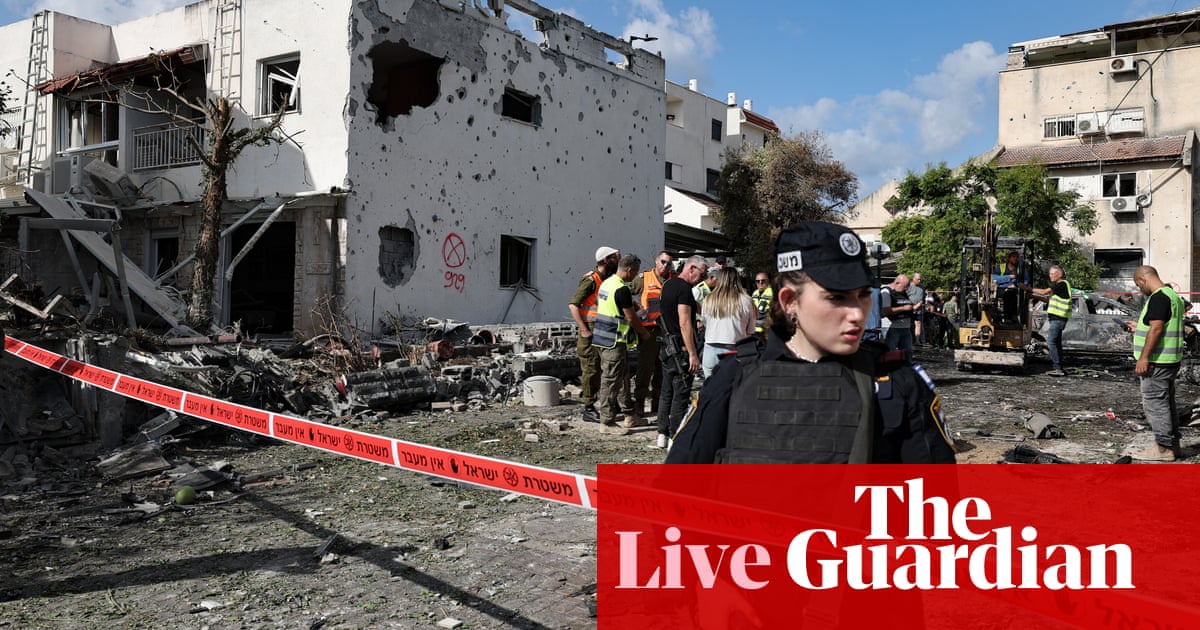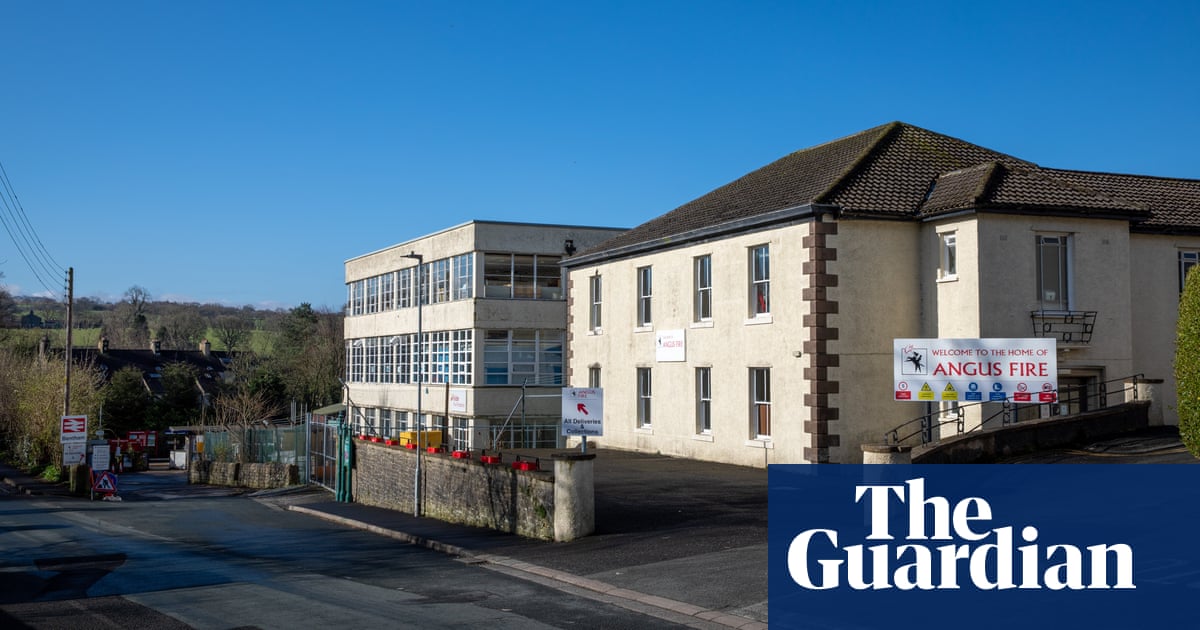Hezbollah strikes Israeli defence company’s industrial complexes in ‘initial response’ to pager attacks
William Christou
William Christou is reporting from the Lebanese capital, Beirut
Hezbollah has said it has struck industrial complexes belonging to Israeli defence company Rafael, just near Haifa, in northern Israel, early on Sunday morning.
The group said in a statement said the attack was part of an “initial response” to the pager and walkie-talkie attacks which left more than 3,000 wounded and 42 dead across Lebanon on Tuesday and Wednesday. It is widely believed that Israel was behind the attacks, though it has not publicly claimed responsibility.
Fighting in south Lebanon and north Israel reached its most intense yet overnight, with Israel launching wide-ranging air strikes which it said targeted Hezbollah missile launchers across Lebanon’s south.

Videos of the resulting explosions with visible shockwaves being filmed from afar widely circulated Lebanese social media. At least one was killed and another injured in the strikes, the Lebanese ministry of health said.
In turn, Hezbollah shot a barrage of rockets at north Israel overnight, targeting Ramat David airbase south east of Haifa in the early hours of Sunday morning — the furthest the group has hit since fighting began in October.
The renewed fighting comes days after Israeli defence minister Yoav Gallant said Israel was approaching a “new phase” in the war with Hezbollah. Secretary general of Hezbollah Hassan Nasrallah said in a Thursday speech that the intensified Israeli attacks would not stop the group from continuing its attacks on Israel, until a ceasefire in Gaza was reached.
Key events
Iran’s foreign minister, Abbas Araghchi, has been speaking to the media in New York ahead of the UN general assembly. According to the Hareetz reporter Allison Kaplan Sommer, he said Israel “has created a real hell in Gaza” and that “the crimes of the Zionist regime in Lebanon, even though they are being committed out of frustration, will not be left without response”.
“The main hurdle in achieving ceasefire and stopping this war has really been the support provided by the US and Western countries,” Araghchi said, as he blamed western support for Israel being able to continue its devastating military actions.
Gaza rescuers say Israeli strike on school shelter kills seven people
Al Jazeera has quoted Gaza’s civil defence as saying that seven people have been killed by Israeli bombing of the Kafr Qasim school in the al-Shati refugee camp in western Gaza City, which has been housing hundreds of displaced people.
Civil defence agency spokesperson Mahmud Bassal reported “seven martyrs and a number of wounded, including serious cases, as a result of Israeli shelling of Kafr Qasim school” in the refugee camp.
It follows reports of an attack yesterday on the al-Falah school in the al-Zeitoun neighborhood of Gaza City, in which 21 people, including 13 children, were killed, according to Wafa, the Palestinian news agency.
Trevor Phillips puts it to Isaac Herzog that Israel has been widely accused of being behind the deadly pager and walkie-talkie explosions in Lebanon last week, in which children were among those who were killed. Philips asks the Israeli president if this was a “legitimate way to prosecute a war”, given the fact there was no way of ensuring civilians were not killed in the attack. “I reject out of hand any connection to this or that source of operation,” Herzog said. He did not answer the question directly, but instead talked about the rocket attack – which Israel blamed on Hezbollah – that struck the predominantly Druze town of Majdal Shams in the mountainous Golan Heights, close to the border with Syria, in July, in which at least 12 people, including children, were killed. Herzog said that Israel, as a sovereign nation, has a right to defend itself.
Israel does not want war with Lebanon, Israeli president says
Israel’s president, Isaac Herzog, has been interviewed by Sky News’ Trevor Phillips on his Sunday morning politics programme in the UK. Herzog says that Israel “does not want war” with Lebanon, claiming that the conflict was “instigated” by Iranian proxies in the region, including Hezbollah and Yemen’s Houthis, as well as Hamas in Gaza.
“Israel is fighting for its well being, its existence, its citizens. That’s what we are doing. And we are doing whatever is the right thing to do,” he said, adding that Lebanon has been hijacked by Hezbollah, which he described as a “terror organisation”.
“It is being armed to its teeth by the Iranian empire of evil,” he said, stressing that Israel wants to bring Israeli hostages back from Gaza and to return Israeli citizens “back to their homes on the border with Lebanon”.
Israel’s military said on Sunday that it intercepted a “suspicious aerial target” launched from the east, and that no damage or injuries were reported.
Earlier, an official in the Islamic Resistance in Iraq, a loose coalition of Iranian-backed militias that oppose US support for Israel in the war on Gaza, said they launched cruise missile and explosive drone attacks at Israel.
Pro-Iranian militias in Iraq have claimed responsibility for drone attacks on Israel multiple times since the outbreak of war in Gaza almost a year ago.
You can read more about who the Islamic Resistance in Iraq are in this useful explainer by the Guardian’s defence and security editor, Dan Sabbagh, here:
Hezbollah strikes Israeli defence company’s industrial complexes in ‘initial response’ to pager attacks
William Christou
William Christou is reporting from the Lebanese capital, Beirut
Hezbollah has said it has struck industrial complexes belonging to Israeli defence company Rafael, just near Haifa, in northern Israel, early on Sunday morning.
The group said in a statement said the attack was part of an “initial response” to the pager and walkie-talkie attacks which left more than 3,000 wounded and 42 dead across Lebanon on Tuesday and Wednesday. It is widely believed that Israel was behind the attacks, though it has not publicly claimed responsibility.
Fighting in south Lebanon and north Israel reached its most intense yet overnight, with Israel launching wide-ranging air strikes which it said targeted Hezbollah missile launchers across Lebanon’s south.
Videos of the resulting explosions with visible shockwaves being filmed from afar widely circulated Lebanese social media. At least one was killed and another injured in the strikes, the Lebanese ministry of health said.
In turn, Hezbollah shot a barrage of rockets at north Israel overnight, targeting Ramat David airbase south east of Haifa in the early hours of Sunday morning — the furthest the group has hit since fighting began in October.
The renewed fighting comes days after Israeli defence minister Yoav Gallant said Israel was approaching a “new phase” in the war with Hezbollah. Secretary general of Hezbollah Hassan Nasrallah said in a Thursday speech that the intensified Israeli attacks would not stop the group from continuing its attacks on Israel, until a ceasefire in Gaza was reached.
Here are some of the latest images coming out of the newswires from northern Israel, where Hezbollah says it has fired rockets:
The Israeli army have continued attacks across southern and central Gaza today, killing at least seven Palestinians, according to Wafa, the Palestinian news agency.
Israeli artillery reportedly targeted the town of Khuza’a, east of the southern city Khan Younis, killing two people.
Emergency teams from the Palestinian Red Crescent later recovered the bodies of four people from the al-Attatirah area east of Rafah, after Israeli airstrikes.
In another attack, Wafa reports that one person was killed after an Israeli army quadcopter – a drone with four propellers – opened fire on civilians west of the Nuseirat refugee camp in central Gaza. These reports have not yet been independently verified by the Guardian.
Middle East is on brink of ‘imminent catastrophe’, UN official warns
The United Nations special coordinator for Lebanon, Jeanine Hennis-Plasschaert, has warned of an “imminent catastrophe” in the Middle East.
“With the region on the brink of an imminent catastrophe, it cannot be overstated enough: there is no military solution that will make either side safer,” she wrote in a brief statement on X.
Overnight barrage of Hezbollah rockets launched into Israel, IDF says
Welcome to our live coverage of Israel’s war in Gaza and the wider Middle East crisis.
Hezbollah launched more than 100 rockets early on Sunday from Lebanon targeting a wide area of northern Israel, according to Israel’s military, with some landing near the city of Haifa.
The rocket barrage overnight set off air raid sirens across northern Israel, sending thousands of people scrambling into shelters. The Israeli military said rockets had been fired “toward civilian areas”, pointing to a possible escalation after previous barrages had mainly been aimed at military targets.
In posts on X, the Israel Defense Forces (IDF) said Lebanon launched two waves of attacks – the first about 85 rockets where some of them were intercepted, including crashes detected in the areas of Kiryat Bialik, Tzur Shalom and Moroshet. The second attack included 20 rockets after alerts were issued in the in the Jezreel Valley area, according to the IDF.
Israel’s Magen David Adom rescue service said it treated four people for shrapnel wounds, including a 76-year-old man who suffered minor injuries in Kiryat Bialik, a community near Haifa where buildings were damaged and cars set on fire. It was not immediately clear if the damage was caused by a rocket or an Israeli interceptor.
Earlier, the Israeli military said it launched airstrikes on hundreds of targets in southern Lebanon in the wake of the deepest rocket attacks by Hezbollah into Israel since the start of the war in Gaza last October. The IDF said on Saturday night it launched two wave of attacks – one attacking about 290 targets, and a second targeting 110 sites.
Earlier, Hezbollah posted on its Telegram channel that it had targeted the Israeli Ramat David airbase near Haifa on Saturday night with dozens of missiles in response to what it described as “repeated Israeli attacks on Lebanon”.
The airbase is the furthest target the Lebanese group has hit in Israel since October, about 50km from the Lebanon-Israel border.
Here is a recap of the latest developments:
-
Hospitals in northern Israel have been instructed to transfer their operations to facilities with extra protection from rocket and missile fire, the health ministry said on Sunday. Rambam hospital in Haifa will transfer patients to its underground, secure facility, the ministry said. Meanwhile, the military’s Home Front Command said schools and other educational institutions and activities would not be permitted in the north until at least Monday at 6pm local time.
-
The death toll from an Israeli airstrike that targeted Hezbollah military commanders in Beirut’s southern suburbs has risen to 45, Lebanon’s health ministry said on Sunday, updating an earlier toll of 37 from the Friday attack.
-
News broadcaster Al Jazeera said on Sunday morning that Israeli forces raided its bureau in the West Bank’s Ramallah city with a military order to close it for 45 days. The Qatar-based channel aired live footage of the Israeli troops entered the channel’s office and handed over a closure order to one of the Al Jazeera TV staff. Al Jazeera’s West Bank bureau chief, Walid al-Omari, reported that Israeli troops brought a truck to confiscate documents, devices and office property. In a statement, the Palestinian Journalists’ Syndicate condemned the raid, saying “this arbitrary military decision is considered a new violation against journalistic and media works”.
-
The US state department has urged Americans in Lebanon to leave the country while commercial options remain available. “At this time, commercial flights are available, but at reduced capacity. If the security situation worsens, commercial options to depart may become unavailable,” it added.
-
The death toll from an Israeli strike on Saturday on a school-turned-shelter in Gaza city included “13 children and six women”, one of whom was pregnant, said civil defence agency spokesperson Mahmud Bassal. The Gaza health ministry said at least 22 had died as a result of the strike.
-
US national security adviser Jake Sullivan said he was worried about escalation between Israel and Lebanon. Sullivan, speaking with reporters in Wilmington, Delaware, said yesterday that he still sees a path to a ceasefire in Gaza but that the US is “not at a point right now where we’re prepared to put something on the table”.
-
Attacks on Lebanon this week showed that the Israeli government planned to spread the war to the region, Turkey’s president Recep Tayyip Erdoğan said, calling on western countries to take “deterrent steps” against Israel’s actions. Erdoğan told a press conference that Israel’s war in Gaza will top the agenda of his speech at the UN general assembly on Tuesday. “It is time for all countries with the mission of protecting world peace to come up with solutions that will stop Israel,” Erdoğan said.
-
Iran unveiled its “jihad” single-stage liquid-fuel ballistic missile with a high-explosive detachable warhead and a range of 1,000km, according to state TV. The missiles were displayed on Saturday, along with other military hardware, during a parade marking the anniversary of the start of the 1980-88 war with Iraq.
-
At least 41,391 Palestinians have been killed and 95,760 injured in Israel’s military offensive on Gaza since 7 October, Gaza’s health ministry said on Saturday. Gaza’s ministry of health does not distinguish between civilians and militants in its count.
-
Israel’s prime minister, Benjamin Netanyahu, postponed his trip to the US by a day due to the security situation in the country’s north. Netanyahu was due to travel to New York on 24 September, during which he is expected to address the annual UN general assembly. He issued a short statement after the Beirut airstrike, saying: “Our goals are clear, and our actions speak for themselves.”



